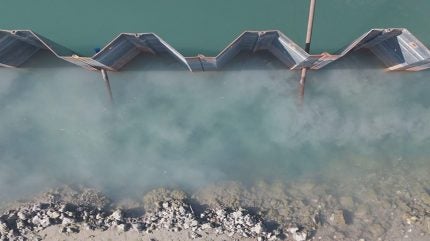
The Port of Rotterdam has implemented carbon-storing harbour infrastructure through a collaboration between Hakkers, a Dutch construction and engineering firm, and Paebbl, a company that transforms captured CO₂ into permanent carbon-storing materials.
This initiative marks an advancement in reducing the environmental impact of maritime anchoring by replacing a portion of the traditional cement content with Paebbl’s innovative carbon-storing materials in the anchoring mix.
Hakkers utilises around 5,000 tonnes (t) of cement annually for various civil engineering projects, which equates to nearly 20% of the Dutch anchoring market.
In a recent quay wall project, Hakkers replaced 15% of the conventional cement with Paebbl’s carbon-storing product, which resulted in the sequestration of 110kg of CO₂/t of materials used, totalling 500kg.
Hakkers Foundations commercial manager Jeroen Kuup said: “We’re always on the lookout for innovative ways to minimise our carbon footprint at industrial scale. Traditional anchoring systems rely heavily on cement, which generates considerable CO₂ emissions.
“Partnering with Paebbl on these maritime infrastructures allows us to explore a more sustainable approach without compromising on the scale, reliability and performance that our clients expect.”

US Tariffs are shifting - will you react or anticipate?
Don’t let policy changes catch you off guard. Stay proactive with real-time data and expert analysis.
By GlobalDataThe project also showcased the use of fully electric drilling equipment, which eradicated direct exhaust emissions and significantly reduced air pollution during the construction phase.
This aligns with the broader industry’s push towards sustainable practices, especially given that cement production is responsible for 8% of global carbon emissions.
Paebbl’s technology transforms CO₂ into a stable mineral form, effectively turning construction projects into carbon sinks.
The company’s material not only offers permanent CO₂ storage capacity, which can sequester up to 300kg of CO₂ per 1,000kg produced, but can also substantially decrease the embodied carbon in construction materials.
Replacing a portion of cement with Paebbl’s product can cut the embodied carbon in construction by up to 30%.
Paebbl vice president of products Ana Luisa Vaz said: “Carbon sink building solutions can be scaled up to industrial applications and we are delighted to see our product deployed in the field.
“Working with leading engineering firms such as Hakkers, and building Port of Rotterdam’s critical infrastructure, shows that carbon sink building solutions can be scaled up to industrial applications. We’re very excited for our shared future with Hakkers, expanding our collaboration and identifying additional use cases.”



